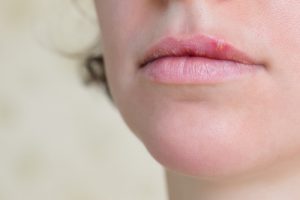
Previous research on cold sores has found that they can be tied to memory loss, but more recent study has made another conclusion about cold sores and your brain.
A cold sore is a form of the herpes simplex virus and can come in two forms – herpes simplex type one (HSV-1) and herpes simplex type two (HSV-2). Type one is the more common of the two forms and usually appears around the mouth. They can burn, cause pain and be itchy, as well as last for quite a number of days.
Although there is no current prevention or cure for cold sores, medications and topical creams can shorten their duration and reduce their frequency.
Cold sores are also highly contagious, so if you have one, try to avoid any close human contact. The majority of the population carries HSV-1 and only when it’s activated does it create the cold sore. Once you do have the virus, you will have it for life.
What a cold sore has to do with your brain
As I mentioned, previous research has uncovered that cold sores can affect your memory – and not in a good way. The new research from Umea University in Sweden discovered that being a carrier of HSV-1 almost doubles a person’s risk of developing Alzheimer’s disease.
In their study, researchers followed 3,432 participants for 11 years. Within those participants who had reactivated HSV-1 – or experienced reoccurring cold sores – they were nearly twice as likely to develop Alzheimer’s disease.
A diagnosis of Alzheimer’s can only be made certain after death. Researchers used neuroimaging techniques to confirm the diagnosis. They were looking for amyloid plaques, which is considered a hallmark of Alzheimer’s.
The researchers also noted that those participants over 60 with the Alzheimer’s diagnosis experienced more immune changes in relation to HSV-1. Although they don’t know why exactly this occurs, or if the cold sores caused the Alzheimer’s, they did find the HSV-1 became more reactive in those in that age group with Alzheimer’s.
Overall, more testing needs to be conducted to reveal an exact link, but the findings do, for now, offer us some insight into cold sores and the brain.
Alzheimer’s remains a mystery
Alzheimer’s disease progresses over time, leaving people forgetful, with changes in their behavior and in their thinking. It’s the most common form of dementia, and although it usually affects people over 65, it is not a normal part of aging.
Although, like cold sores, Alzheimer’s does not have a cure or a sure way to prevent its onset. But as research continues, new treatment strategies to manage symptoms are available.
Keep your memory sharp
Memory loss and becoming forgetful does not have to be a sign of aging, and you can take steps to keep your memory sharp. Harvard Health has five tips that can help you protect your memory that I’d like to pass along: Managing stress, quitting smoking, getting a good night’s sleep, drinking alcohol in moderation, and preventing brain injuries.
These are important tips, but I’m also a big believer in food as a means to good health. You can eat for your brain! A diet full of omega-3 fatty acids, antioxidants that can be found in cherries or blueberries, green leafy vegetables like spinach or kale, as well as cruciferous vegetables like broccoli are all excellent.
Also flavonoids, the kind found in wine (in moderation!), dark chocolate and tea, can all give your brain a boost to hold onto its memories.
Lastly, playing games that will keep your mind active is great for memory. Completing a crossword or other puzzle, or a memory match-up game can keep your brain going strong.
Although the link between cold sores and Alzheimer’s isn’t fully understood, we are one step further to knowing more about protecting our memories. If you get them often, this could be a sign of more serious immune issues, so speak to your doctor.
Related Reading: Natural remedies to cure sore throat